By Shaely Ritchey
“Imagine others complexly” – John Green, Paper Towns
More than just a quote, imagining others complexly is an important call to action and perhaps one of the most important personal endeavours we can undertake in our lives. Not only is it one of the greatest gifts we can give to the wider world, it is also a gift we can give to ourselves; this seems especially important in our recovery journeys where creating a broader identity for ourselves is one of the major goals we are tasked with challenging though it might be.
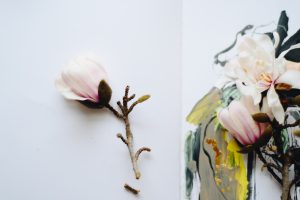 In the midst of our struggles the world can seem especially small; eating disorders in particular have a knack for shrinking our experiences, perspectives, and our opportunities to engage with life in ways that are meaningful to us. They can make it seem as if they are all that has ever, and will ever, exist. Many individuals struggling with eating disorders can relate to feeling their identity and self-worth becoming entangled with the disorder so much so that it becomes frightening to imagine ourselves outside of it because without the eating disorder, who are we and how do we matter in the world? The small world of an eating disorder may be limiting, but it is also safe and controllable and having our identity stop there keeps us from facing larger, more overwhelming existential questions in life. Who are we without our eating disorders as our whole source of identity? Well, the truth is we could be anyone… Being faced with endless choice, endless possibilities is quite a freeing notion, but it can also be quite paralyzing and thus quite frightening.
In the midst of our struggles the world can seem especially small; eating disorders in particular have a knack for shrinking our experiences, perspectives, and our opportunities to engage with life in ways that are meaningful to us. They can make it seem as if they are all that has ever, and will ever, exist. Many individuals struggling with eating disorders can relate to feeling their identity and self-worth becoming entangled with the disorder so much so that it becomes frightening to imagine ourselves outside of it because without the eating disorder, who are we and how do we matter in the world? The small world of an eating disorder may be limiting, but it is also safe and controllable and having our identity stop there keeps us from facing larger, more overwhelming existential questions in life. Who are we without our eating disorders as our whole source of identity? Well, the truth is we could be anyone… Being faced with endless choice, endless possibilities is quite a freeing notion, but it can also be quite paralyzing and thus quite frightening.
Having identity based on illness contributes, in part, to the competitive nature of eating disorders because when we have nothing else to identify ourselves by, we can feel threatened when others have similar identities wrapped up in the same illness. It is important to recognize that we also live in a culture that is highly focused on competition and vague notions of success in life being akin to being “the best” and standing out amongst the crowd; these cultural expectations also fuel this competitiveness and it is important to challenge how well they serve us in our lives.
That said it is quite natural to have part of one’s identity reside in their current struggles in life whether those are transient or persistent, whether they are mental health related or pertain to physical health or some other aspect of human life. To say that no part of a person’s identity can reside there or that these issues should not be focused on can quickly become an ableist critique. The problem occurs when we only imagine others or ourselves as being one thing and all of our life and self-worth resides there. It keeps our world much smaller than it can otherwise be.
Recovery then, asks us to imagine ourselves outside of our struggles and to begin building an identity that is broader than our eating disorder. It is an enormous, but critical task in recovery and life in general. None of us are single stories or solely defined by one aspect of our being. It does not matter how small your life may feel at the moment, each one of us is still far more than a single, or simple, story. None of us is described in entirety by a diagnosis, rather diagnoses are always situated in the context of a person – their environment, their past, their hopes and dreams, their interests, their strengths and weaknesses, their cultural history, their genetics, their tendencies, their present lives and plans for the future, and so on. As we gain confidence in recovery and we begin to break out from the hold our eating disorder had on us and our lives, we can begin to explore the rest of who we are and to grow these aspects of ourselves. Sometimes it is not so much about focusing solely on shrinking the eating disorder, but including the focus on expanding the rest of our lives, which naturally shrinks the amount of time and energy that the eating disorder portion takes up.
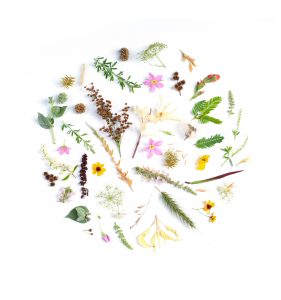 It is important to remember all of this when we think of others as well – friends, those we do not necessarily get along with, family, strangers, partners, or patients that we are supporting in recovery. Because we do not know others internal worlds as intimately as we know our own, it is much easier to label them or reduce them to single stories, but no person is as simple as a single story and we do them a disservice if we are limiting them to such. Even an eating disorder, which is a pattern of characteristics that tell us something about someone, does not tell us everything and we must strive to not fall into the trap of letting that be the sole descriptor of a person even if it is the primary basis on which we know the person.
It is important to remember all of this when we think of others as well – friends, those we do not necessarily get along with, family, strangers, partners, or patients that we are supporting in recovery. Because we do not know others internal worlds as intimately as we know our own, it is much easier to label them or reduce them to single stories, but no person is as simple as a single story and we do them a disservice if we are limiting them to such. Even an eating disorder, which is a pattern of characteristics that tell us something about someone, does not tell us everything and we must strive to not fall into the trap of letting that be the sole descriptor of a person even if it is the primary basis on which we know the person.
It is challenging to do this because humans like simple categories, even systems and structures in our society lean towards this tendency to simplify and categorize for functional reasons. Our healthcare system for example, still largely utilizes the medical model that has its benefits and drawbacks. One of the limitations of this model is the tendency to pursue objectivity to an extent that classifies people as a simple set of problems to be solved. It tends to focus in on the diagnosis and the easily measured aspects of illness without paying critical attention to the context of a person, their immediate environment, the larger cultural context, as well as other aspects of the human experience. Essentially it fails to imagine patients complexly.
Imagining others and ourselves complexly gives us the freedom of unlimited potential to learn and grow and be anything. When we imagine complexly we give the gift of letting ourselves and others make mistakes and be imperfect without judgment, which is something we all deserve to be able to do. When we imagine complexly we give room to ourselves to work towards a future that may seem impossibly far away in the moment. When we imagine complexly we hold this space for others who may not be able to envision that future for themselves until they are in a better place of imagining for themselves. When we imagine complexly we acknowledge that we are already enough and that the human ability to evolve in life knows no bounds.
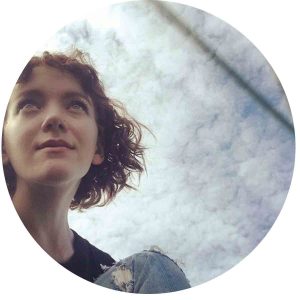
Shaely is a registered nurse with interest in further education in nursing or medicine. She is also a passionate mental health advocate in her community. In her spare time she loves taking photographs, getting outdoors, and petting as many dogs as she can.
By Katalina Bernards
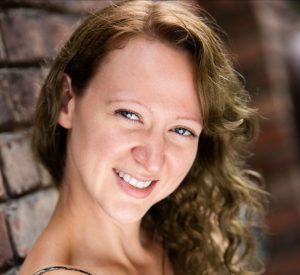 Katalina Stephens has done amazing work for the Looking Glass Foundation over the past 3 years, as our fearless, thoughtful and articulate Volunteer and Community Manager. Her passion, empathy and dedication to the role have been evident as she welcomed and trained hundreds of new volunteers into our Looking Glass programs, developed our Personal Recovery Space training materials, coordinated volunteers for several Looking Glass Galas, and put her heart and soul into building important connections with our entire community. We know she carries those connections close to her heart as she embarks on this new chapter of her life.
Katalina Stephens has done amazing work for the Looking Glass Foundation over the past 3 years, as our fearless, thoughtful and articulate Volunteer and Community Manager. Her passion, empathy and dedication to the role have been evident as she welcomed and trained hundreds of new volunteers into our Looking Glass programs, developed our Personal Recovery Space training materials, coordinated volunteers for several Looking Glass Galas, and put her heart and soul into building important connections with our entire community. We know she carries those connections close to her heart as she embarks on this new chapter of her life.
In this blog post, Kat shares her reflections on leaving this role and the importance of being honest with yourself about what you need and want out of your life, and finding joy and peace in the simple things.
I have loved my role at Looking Glass. I love the people I work with, I love the volunteers I get to connect with, I love the participants and loved ones who reach out to us for support, I love our donors, and I love our Board of Directors and passionate Committee members. More than anything, I love serving a community that needs, deserves, and rewards my passion and commitment.
So why would I leave?
 There's no simple answer to that question. I read a blog about leaving a job you love, and it presented the argument that "no matter how much you love your job, it will never love you back." Well, respectfully, I disagree. Looking Glass has loved me back from day one, there is no doubt in my mind about that. But I came to realize that no matter how fulfilling this role is, I was missing out on something that is really important to my wellbeing and happiness. My husband and I made the move from the big city over to my hometown of Bowen Island back in December, and I have been commuting to the LGF office from there. It's not as crazy as you may think; hundreds of Bowen Islanders commute every single day! But it does take time: three hours per day, to be exact. And all that time away from my home community was displacing the very reasons I chose to live there in the first place: community connection and belongingness. My soul has been calling out for more island time. More chatting in the line at the grocery store. More walking in the woods with the deer. More community recreation. More family and friends time. More time to just be myself.
There's no simple answer to that question. I read a blog about leaving a job you love, and it presented the argument that "no matter how much you love your job, it will never love you back." Well, respectfully, I disagree. Looking Glass has loved me back from day one, there is no doubt in my mind about that. But I came to realize that no matter how fulfilling this role is, I was missing out on something that is really important to my wellbeing and happiness. My husband and I made the move from the big city over to my hometown of Bowen Island back in December, and I have been commuting to the LGF office from there. It's not as crazy as you may think; hundreds of Bowen Islanders commute every single day! But it does take time: three hours per day, to be exact. And all that time away from my home community was displacing the very reasons I chose to live there in the first place: community connection and belongingness. My soul has been calling out for more island time. More chatting in the line at the grocery store. More walking in the woods with the deer. More community recreation. More family and friends time. More time to just be myself.
Having had countless conversations about self-care and the high importance of prioritizing wellbeing while working in mental health, I have come to recognize that it is time for me to step away from the city so that I avoid burnout. In my first-ever edition of the Volunteer Newsletter's Self-Care Corner, I encouraged the Looking Glass community to "find your forest," due to the stress-relieving, happy-making effects of immersing yourself in Nature.
Well, I have found my forest again, and the path there is calling me home to stay.
In this spirit, I wanted to share some resources with you that might help if you, too, are finding it hard to take a step back from something you love, and are at risk of burning out. Self-care, after all, is not about doing what we want, it's about doing what we need; the things that build resilience and allow us to feel like ourselves. It's caring for yourself in the same way that you care for others.
This great article from Psych Central breaks down what exactly self-care means, why we need it, and how we can begin to prioritize ourselves so that we can learn how to listen and respond effectively to what our deepest self is asking for.
Take it from this writer at Tiny Buddha – it's more than okay to slow down, to stop pursuing something that no longer fits in your life, to not have all the answers, and to explore your own uncertainties in depth. It might just be exactly what you need.
In this digital age, it's easy to become over-reliant on self-soothing rituals like Netflix and social media to recharge. This interesting Quartz article encourages us to re-evaluate our approach to weekends and downtime in order to nourish our desire for connection. Spoiler alert: volunteering is a key factor in positive self-actualization!
Remember...
We ALL need self-care. No matter who we are or how organized we may feel, our journeys are only as sustainable as our self-care practices. If you are facing any struggles with your own mental health, please reach out for support. Your wellbeing comes first.

As I get ready to feel the forest beneath my feet again, I just want to say the most sincere, heartfelt “thank you” to all of you who love and support the Looking Glass Foundation. You courageously share of yourselves and break down barriers every time you show up in support of recovery, and it has truly been my great privilege to walk with you in this mission. Thank you for everything. Catch me on Bowen sometime!
Although it is always difficult to say goodbye, we are so thrilled for Katalina Stephens as she shifts her focus towards family, friends, and forest trails in her hometown of Bowen Island. Kat – we wish you the best of luck in everything you do!
This week I read an article in the Globe and Mail that was all about resilience. In the mental health field, we hear a lot about resilience. Why do two people, who have experienced the same kinds of trauma, have different outcomes? What leads to someone being resilient when their life gets turned upside down? A lot of what we read about comes back to specific traits that the individual possesses. For example, having a positive attitude, perseverance, grit etc.
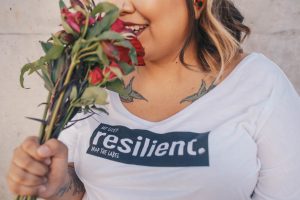 What this article highlighted, however, was that resilience doesn’t come from the individual but rather from the community the individual surrounds himself with. I actually found this really interesting because so much of what we talk about and focus on in mental health is strengthening the individual. The science behind his research seems pretty sound so I think it deserves more exploration. In thinking about this with eating disorders, I realized just how true this can be. When people feel like they are a part of a community, it makes them feel less isolated and often more willing or able to take steps towards recovery. When we know another person, or people, are there for us and care about our journey, it gives us the courage to explore our inner pain and find steps towards freedom. What I didn’t agree with in the article is the author implied that basically any support was better than none. In eating disorder recovery, I haven’t found this to be the case. If those in an individual’s life aren’t able to support their recovery in a healthy way, then the community can be at times what keeps them stuck. This is where so much work gets done on building resilience within the individual so that they can choose to move themselves forward either way. I think if we wait for the community to show up each time, it may be too late so instead the focus needs to be on finding the right community and also doing your own work; building resilience within and outside of yourself so that when the storm comes, as it always does when we work through recovery, you’re ready and equipped.
What this article highlighted, however, was that resilience doesn’t come from the individual but rather from the community the individual surrounds himself with. I actually found this really interesting because so much of what we talk about and focus on in mental health is strengthening the individual. The science behind his research seems pretty sound so I think it deserves more exploration. In thinking about this with eating disorders, I realized just how true this can be. When people feel like they are a part of a community, it makes them feel less isolated and often more willing or able to take steps towards recovery. When we know another person, or people, are there for us and care about our journey, it gives us the courage to explore our inner pain and find steps towards freedom. What I didn’t agree with in the article is the author implied that basically any support was better than none. In eating disorder recovery, I haven’t found this to be the case. If those in an individual’s life aren’t able to support their recovery in a healthy way, then the community can be at times what keeps them stuck. This is where so much work gets done on building resilience within the individual so that they can choose to move themselves forward either way. I think if we wait for the community to show up each time, it may be too late so instead the focus needs to be on finding the right community and also doing your own work; building resilience within and outside of yourself so that when the storm comes, as it always does when we work through recovery, you’re ready and equipped.
My favorite tools for building internal resilience:
Breathing: I’ve said this many times but learning to come back to the present moment and breathe can ground us and give us a moment to calm ourselves before reacting
Self-Care: Learning to prioritize your wellbeing is critical when living with an abuser in your head who is trying to destroy you. Remember, self care isn’t all bubble baths and cups of tea, sometimes it’s following through with your meal plan or cutting your exercise routine down by 5 minutes.
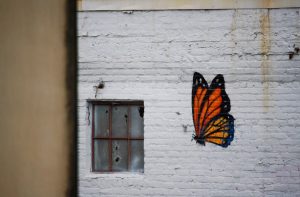 Maintaining Hope: Recovery is hard, but it’s made harder when we tell ourselves it won’t happen. Holding onto the belief that full recovery is possible and reminding yourself that there will be good days and bad days gives purpose to our struggle. We can’t promise it will be easy, only that it will be worth it.
Maintaining Hope: Recovery is hard, but it’s made harder when we tell ourselves it won’t happen. Holding onto the belief that full recovery is possible and reminding yourself that there will be good days and bad days gives purpose to our struggle. We can’t promise it will be easy, only that it will be worth it.
If you are feeling pulled to be a bigger part of our community, please reach out. We are always here to provide support and want you to know you aren’t alone.
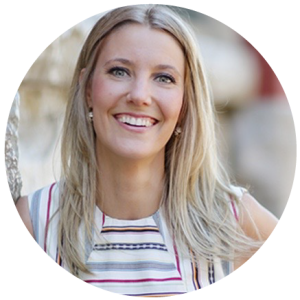 Kaela Scott is a Registered Clinical Counsellor who specializes in Eating Disorders. She runs her own private practice and works with the Looking Glass Foundation in both their summer camp and their Hand In Hand Program. She has been passionate about working with eating disorders since freeing herself from her own struggle and realizing what it is like to be happy and well. When she isn’t working, you can find Kaela either cozying up with a cup of tea and her friends or up in the mountains going for a hike.
Kaela Scott is a Registered Clinical Counsellor who specializes in Eating Disorders. She runs her own private practice and works with the Looking Glass Foundation in both their summer camp and their Hand In Hand Program. She has been passionate about working with eating disorders since freeing herself from her own struggle and realizing what it is like to be happy and well. When she isn’t working, you can find Kaela either cozying up with a cup of tea and her friends or up in the mountains going for a hike.
By Alia Chan
As my time at the Looking Glass Foundation as a practicum student nears its end, I wanted to take the time to reflect and think about the impact working with the organization has had.
While at the Looking Glass, I was given the opportunity to dip my toes in different areas of the organization. From receiving in-depth training about eating disorders and the various support platforms, to working on volunteer training handbooks and reviewing all the amazing scholarship applications, my favourite role has to have been helping out at the Starry Night fundraising gala.
To begin, I want to acknowledge first how much organization and preparation is put into this night. Being part of the planning and getting a front-row seat to the workings of this evening was inspiring and is evidence of the power of a small group of people with a good cause. It is with this type of drive and spirit that organizations like the Looking Glass Foundation are created in the first place, and so I feel grateful to have been part of such magic.
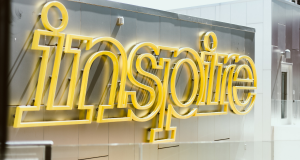 What inspired me the most about that night however, was seeing it come to life, seeing the community of Vancouver come together for such a special cause, and seeing first-hand how those efforts touch the lives of those individuals struggling with eating disorders. I was lucky enough to have been paired with a former client of the Looking Glass Residence that night. Being only a practicum student, the Residence was not an area we were introduced to much as it is outside our scope of expertise, and so working with this individual that night was truly amazing. I got to hear parts of her success story, see her interact with the staff of the foundation, and see the impact they have made on her – and the impact she had made on them. It was during this part of the evening that I felt true gratitude that I was able to complete my practicum at an organization that builds such strong connections within the community and makes it its purpose to ensure help is given to those in need.
What inspired me the most about that night however, was seeing it come to life, seeing the community of Vancouver come together for such a special cause, and seeing first-hand how those efforts touch the lives of those individuals struggling with eating disorders. I was lucky enough to have been paired with a former client of the Looking Glass Residence that night. Being only a practicum student, the Residence was not an area we were introduced to much as it is outside our scope of expertise, and so working with this individual that night was truly amazing. I got to hear parts of her success story, see her interact with the staff of the foundation, and see the impact they have made on her – and the impact she had made on them. It was during this part of the evening that I felt true gratitude that I was able to complete my practicum at an organization that builds such strong connections within the community and makes it its purpose to ensure help is given to those in need.
The welcoming and kind energy the Looking Glass fosters as an organization is the type of essence I hope to bring as a future counsellor. The team at the Foundation is warm and passionate, and I believe this is how they genuinely help those in the eating disorder community to recover.
So, I thank the Looking Glass Foundation family for allowing me to be a part of the organization and assisting me in my journey as a counsellor. I hope our paths cross again.
 Alia Chan is a Master of Counselling Psychology Student who has a passion for learning about people and their stories – the struggles and the resilience. She has enjoyed working with the Looking Glass for her Social Justice Practicum and is excited to take the knowledge and insight she has learned to her professional practice. Alia loves hiking in the Summer and snowboarding in the Winter and is known to be incredibly happy whenever there is a dog around, especially her two pups Timmy and Preston.
Alia Chan is a Master of Counselling Psychology Student who has a passion for learning about people and their stories – the struggles and the resilience. She has enjoyed working with the Looking Glass for her Social Justice Practicum and is excited to take the knowledge and insight she has learned to her professional practice. Alia loves hiking in the Summer and snowboarding in the Winter and is known to be incredibly happy whenever there is a dog around, especially her two pups Timmy and Preston.
By Alex Charleton

You are enough,
A thousand times enough.
And we are all born free,
Yet we spend a lifetime becoming slaves to our own false truths.
Can’t you see?
You are free.
Doing this work doesn’t make you weak,
It makes you incredibly strong, as you strive to step into your truth.
Who are you here to be?
It’s okay to surrender and land on your knee.
Your beauty runs below the surface,
It is not conditional or time limited.
That is the real truth.
You can be yourself here,
The magic is happening as you sit near.
I will sit and stay a while,
To be witness to your love and truth.
Together we can rise up. Give voice to what lies beneath.
The hate, guilt, fear and defeat.
It’s okay now. You got this.
You can lean in and trust your truth.
Can you feel it now? You are enough,
A thousand times enough.
This poem encapsulates the Hand in Hand relationship, based on my experience. It is a partnership, collaborative relationship. In the pairing, I am the sounding board, confidant, and mirror for my matches. I infuse optimism and curiosity. I accept them for exactly who they are, as they show up. I strive to help them rediscover their truth, so that they can live an authentic life and connect deeper to their values. I encourage my matches to embody their freedom and feel that recovery is possible.
Photo: Kelsey Toevs Photography
 Born and Raised on the West coast, I love living among the trees and alongside the ocean. I thrive off of connection. I am a curious creature who loves learning about people and seeing them for who they truly are. I have a big heart, and give all my support to the special people in my life. My core values are integrity, empathy, open-mindedness, and family. If I am not elbow deep in school work, you can find me free styling with recipes in the kitchen, or meditating near the water.
Born and Raised on the West coast, I love living among the trees and alongside the ocean. I thrive off of connection. I am a curious creature who loves learning about people and seeing them for who they truly are. I have a big heart, and give all my support to the special people in my life. My core values are integrity, empathy, open-mindedness, and family. If I am not elbow deep in school work, you can find me free styling with recipes in the kitchen, or meditating near the water.
Interview with Sherene Balanji
We sat down with a long-time Looking Glass volunteer, Sherene Balanji, who will be graduating next year from Simon Fraser University with an Honours degree in Psychology. She is currently working on completing her Honours Thesis exploring the relationship between social media behaviours and disordered eating in undergraduate students. She has been volunteering with Looking Glass in the Hand in Hand program for 3 years, and as a Forum Support volunteer since 2018. Today, she reflects back on the experience of receiving a 2017 Scholarship award from the Looking Glass Foundation.
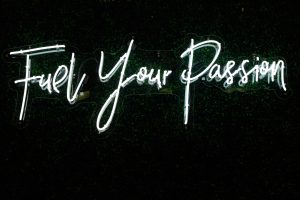 LGF: Thank you for sitting down with us today! So, let’s take things back to 2017: Where were you at in your university studies, and what motivated you to apply for a Looking Glass Pursue Your Passion scholarship?
LGF: Thank you for sitting down with us today! So, let’s take things back to 2017: Where were you at in your university studies, and what motivated you to apply for a Looking Glass Pursue Your Passion scholarship?
Sherene (SB): In 2017 I was about half way through my undergraduate degree and had been volunteering as a Research Assistant in Dr Shannon Zaitsoff’s Weight and Eating Lab at SFU for over a year. By this point I had been in recovery from my eating disorder for over 4 years, and was quite proud of the strides I had made both in my recovery and education, thus the Looking Glass Foundation’s Pursue Your Passion scholarship seemed like a great fit! This was also the year that I solidified my decision to pursue graduate studies in Clinical Psychology, in the hopes of being able to turn my passion for helping others who are struggling with their mental health into a career. However, this pursuit meant that I would need to add a year to my degree in order to complete my Honours Thesis, not to mention the years I would (hopefully) be spending in graduate school. So I sought out financial support, found the Pursue Your Passion scholarship, and quite frankly, pursuing my passion is exactly what this education funding enabled me to do.
LGF: It definitely sounds like it! Tell us about the application process for you. It can be so challenging to write an essay about yourself, especially about something so personal and vulnerable. What was that experience like, and how did you push through that challenge?
SB: By this point, I had actually become quite comfortable telling my story as I had found that every time I was put in a situation in which I discussed my eating disorder or recovery, I felt less and less vulnerable. I had already been in [academic and volunteer] positions for quite some time in which I would be exposed to a lot of eating disorder/recovery related topic, which made me really comfortable discussing (and writing about) my personal experience with recovery. Also, the passion I was (and still am) pursuing has to do with taking my own experience with an eating disorder, learning from it, and using that lesson to help others. I’d spent a lot of time looking back at my experience as something that made me stronger and inspired the path my life had ended up taking, rather than a triggering point in my life.
LGF: You’re so right about that - there’s a lot of power in releasing your own story, and it is often a transformative, resilience-building experience. And, in this case, you were literally rewarded for it! Do you remember where you were or what you were doing when you found out that you had been selected for a scholarship award?
SB: Yes! I was on break at work and, of course, I was super excited! It was probably one of my best days at work. I could not wait to go home and tell my family and friends.
LGF: What did it mean for you in terms of your own recovery, to receive this award?
SB: It helped solidify all the strides I had made in the last 4 years and really highlighted to me how much recovering from my eating disorder had changed my life. It made my recovery feel like it had come around full-circle, which brought me an immense sense of pride.

LGF: Which brings us right up to this moment, today! What are you planning to explore as you near the end of your degree, and what do think might come next for your career?
SB: I will be completing my Honours Thesis next year under the supervision of Dr Shannon Zaitsoff, which will be focusing on undergraduate social media use and body image concerns/disordered eating behaviours. I am particularly interested in image-based platforms like Instagram and how photo manipulation (editing one’s photo to enhance appearance) and photo investment (a person’s concerns about how they are portrayed in a photo, the quality of the photo, the social feedback they receive as a result of sharing the photo, and the effort put into choosing the photo) relate to one’s body image and disordered eating behaviours. This is a budding area of research, leaving many topics left unexplored. I particularly want to ensure that my study includes a mixed-gender sample, as the vast majority of previous studies have only included participants who identify as female, although there is no reason to believe that these behaviours are exclusive to this gender identity.
A side goal of this project is to also hopefully shed some light on positive ways people can use social media, which do not trigger body image concerns or disordered eating behaviours. I personally think that in this day and age, it can be a little unrealistic to expect those in recovery to refrain from social media use, thus I think uncovering ways in which these platforms could be used that do not impede recovery are very important for the field. As far as my career goes, I hope to take about a year off from my studies to work in the field and prepare my graduate school application. I’m planning on applying to a Masters/PhD program in Clinical Psychology in 2021.
 LGF: Wow! All of this is incredibly exciting, and the gender-inclusivity you mentioned in your study design is so important. We look forward to reading your research when it’s ready! In the meantime, what message would you like to offer to those who are applying for a Looking Glass Scholarship this year?
LGF: Wow! All of this is incredibly exciting, and the gender-inclusivity you mentioned in your study design is so important. We look forward to reading your research when it’s ready! In the meantime, what message would you like to offer to those who are applying for a Looking Glass Scholarship this year?
I would like to encourage anyone who is eligible to apply for this award – whether your passion has to do with your eating disorder or it’s completely unrelated, this award is beyond worth taking the time to apply for. Personally, I found that the process of applying was one of the most rewarding parts. I was able to get in contact with my old doctor from when I was struggling, and she was thrilled to see how far I had come and how healthy I was; without applying for this award I don’t think I ever would have gotten to thank her in person for everything she did to facilitate my recovery. Also, asking my professors for reference letters, although minorly intimidating, was actually a great experience – they were thrilled to write them, and it felt great to read their kind words and to know that they were willing to take time out of their busy schedules to assist me with my application. Also, if you’re like me, taking the time to write an essay and reflect on your past, passion(s), and future goals can be a very rewarding experience in itself. Although it may be scary to think about strangers reading about such a vulnerable time, if you’re able to face that fear, you may just inspire someone else to do the same and I think talking about eating disorders and recovery is one of the best things we can do to reduce the stigma and encourage others to seek help.
LGF: Well said, Sherene. Any other final words of wisdom or reflections you’d like to share with our community?
I just want to say thank you so much to the Looking Glass Foundation; I have had nothing but positive experiences with this organization and it has provided me with the most rewarding moments of my life, particularly through my role in the Hand in Hand program. And of course, the organization would not be able to do all that it does without the supportive and open-minded community that it fosters, which I am extremely proud to be a member of, so thank you.
Thank you, Sherene! It is always a pleasure to connect with you, and we are extremely grateful to have you in our community. We wish you all the best in everything you do – and we look forward to hearing more from you in your exciting ongoing career path!

Sherene Balanji will be graduating next year from Simon Fraser University with an Honours degree in Psychology. She is currently working on completing her Honours Thesis exploring the relationship between social media behaviours and disordered eating in undergraduate students. She has been volunteering with Looking Glass in the Hand in Hand program for 3 years, and as a Forum Support volunteer since 2018.
Q: I have been struggling with binge eating for years and am feeling really stuck. Every time I try to change it feels like I take one step forward and two steps back. I am not sure how to get out of this and how to manage all these feelings that come up each time I slip up. What makes it even harder is that every time I look up ways to overcome it I just get bombarded with the latest diet trends and how I need to work on my willpower.

A: I feel like Binge Eating Disorder is only just starting to get the recognition it deserves in the eating disorder world. For so long, the only disorders that have been addressed or acknowledged have been Anorexia, Bulimia and OSFED which has left this entire population even more isolated and their suffering often dismissed as self-imposed. At the Looking Glass Foundation we see and recognize that suffering happens regardless of what side of the spectrum you fall on and are always happy to provide insight and support where we can.
First off, while every person who has an eating disorder is unique, the suffering you experience as a result of an eating disorder is similar, regardless of what side of the coin you fall on. The same way that we absolutely recognize that the solution to Anorexia isn’t just “getting them to eat” the solution to Binge Eating isn’t just “going on a diet and having more willpower.” Binge eating is about using food to deal with painful feelings that you don’t want to experience. Instead of making space for them to fill your body, you fill your body with food so you experience being full of food instead of being full of emotion. What this means is that every time you try to hold back from consuming food, your anxiety will likely kick in because you associate the experience of your emotions as a thing to fear and avoid. While I wish there was a “diet” that could fix this and make everything better (how wonderfully simple it would be if all eating disorders could just be fixed with eating a certain way!), the reality is you have to start learning a new way of relating to yourself and nurturing your heart.
In lots of ways, the idea of this can seem overwhelming, and to be honest it is. I am encouraging you to face yourself in ways that you have likely avoided for a very long time. What I can promise, however, is that learning to face yourself this way will cut out the suffering you experience in your life. Pain is a human condition, we all will feel it and experience it. Suffering is what happens when we don’t allow our pain to take up it’s necessary space in our lives and learn from its messages. So while I can’t ensure you a life free of pain, all these months, years, or decades of suffering can come to an end by you facing your feelings and making space for yourself. Here are a few steps I want to recommend that can help you:
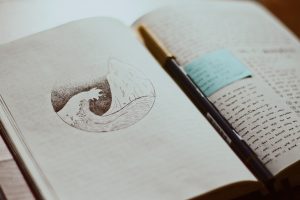 1.Get a journal. This journal is not intended as a Dear Diary, but rather as a space for you to write down what you are noticing. When you choose to go eat your favorite binge foods, I want you to write down what you are actually feeling in your body right after you do it. Do you notice feeling peaceful? Like you just took a long exhale? Warm? Happy? Relieved? What feeling do you notice in your body right after choosing to engage in these behaviors? I am not asking you to notice your thoughts or what you are thinking about having eaten those foods, I just want you to connect to your physical and/or emotional body after you have engaged in behaviors.
1.Get a journal. This journal is not intended as a Dear Diary, but rather as a space for you to write down what you are noticing. When you choose to go eat your favorite binge foods, I want you to write down what you are actually feeling in your body right after you do it. Do you notice feeling peaceful? Like you just took a long exhale? Warm? Happy? Relieved? What feeling do you notice in your body right after choosing to engage in these behaviors? I am not asking you to notice your thoughts or what you are thinking about having eaten those foods, I just want you to connect to your physical and/or emotional body after you have engaged in behaviors.
2. Do The Opposite: In the journal, I also want you to write down what you notice happening in your body when you tell yourself to restrict or try to hold back from binge eating. Does your body tense up? Do you notice feeling anxious or panicky? Do your thoughts start to race or do you start to pace through your house? Do you feel sad? Angry? Resentful? What feeling occupies your body when you feel you can’t engage in these behaviors. We want you to recognize the pattern so that you can stop fearing it and learn to gain control of it. With awareness we can start to take action in small but consistent steps.
3. Take A Few Deep Breaths: I know this sounds trivial and dismissive in the moment but the reality is, so many of us really suck at breathing. We hold our breath, we breathe really shallow breaths, and we ignore one of the best regulation tools we have. Breathing sends a message to our system to relax. When we are anxious, we typically don’t breathe properly which sends our body into greater panic and then we look for a coping mechanism that will soothe us immediately (food). Instead, we want to slow things down, and remind ourselves that in this exact moment, we can choose to be okay and we can choose to take care of ourselves through our breath. No other step is needed, just hitting the pause button for a few moments and breathing. If it is easier, you can do this while walking around the block so you don’t feel like you are sitting right in front of your trigger, trying not to eat, while trying to focus on breathing. The goal of this is just to learn to regulate your body. It doesn’t mean you won’t still turn to food, but if we can get you to start regulating yourself, the frantic approach to eating can decrease and we can have more of a say in how we engage in our behaviors.
4. But I Love Food: I hear this all the time in my office, that the love of food must mean we are destined to never recover. I think it’s great you love food, I love it too, and there is no reason to stop loving it. My guess however, is that when you are bingeing you aren’t actually paying any attention to the food you are eating and instead just focusing on trying to get it in as fast as possible. Recovery isn’t about having to eat only lettuce and plain chicken breasts. Recovery is about learning to pay attention to our bodies and nourish them accordingly, including with some of the foods you genuinely love. We want to eat when we are hungry, and stop when we are full. So if you love food, get really clear on what you love. Don’t just say chocolate, be specific about what type of chocolate in particular you love the most. If it’s fruit, ask yourself what fruit you love the most. Challenge yourself to get really, really clear on what your actual favorites are, and then stop settling for foods you don’t actually love because they were available. Respect yourself enough to stop putting anything or everything into your body that is in front of you. Instead, if you’re going to binge, I hope you honor yourself enough to choose to eat the foods you actually know you love.
5. Reflect, Reflect, Reflect: In your calm moments, I want you to take some time to reflect and write down the role food plays in your life. Please don’t dismiss yourself as solely a food addict who has no control. Get curious. Zoom out and ask yourself what role food plays in your life and what realistic role you want it to play. Try to not hop straight from where you are to recovery. While that is a beautiful end goal, it isn’t the next step you will take, so instead try to focus on a small and consistent step you feel you can commit to. Perhaps this is learning to breathe more intentionally and with more awareness, or maybe you realize you need to strengthen the ways you take care of yourself that have nothing to do with food. Whatever it is, reflect on it, write it down, and then find a way to build consistency in only that way until it becomes your new normal.
There is no race to the finish line of recovery. These things take time, often years, but you have the ability to start honoring yourself and your body today by learning to turn towards yourself and not against yourself. Binge eating is a really serious and very painful eating disorder that you deserve to, and absolutely can, recover from. Looking Glass is here to help if you feel you need a safe place to turn to explore what that process may look like for you.
 Kaela Scott is a Registered Clinical Counsellor who specializes in Eating Disorders. She runs her own private practice and works with the Looking Glass Foundation in both their summer camp and their Hand In Hand Program. She has been passionate about working with eating disorders since freeing herself from her own struggle and realizing what it is like to be happy and well. When she isn’t working, you can find Kaela either cozying up with a cup of tea and her friends or up in the mountains going for a hike.
Kaela Scott is a Registered Clinical Counsellor who specializes in Eating Disorders. She runs her own private practice and works with the Looking Glass Foundation in both their summer camp and their Hand In Hand Program. She has been passionate about working with eating disorders since freeing herself from her own struggle and realizing what it is like to be happy and well. When she isn’t working, you can find Kaela either cozying up with a cup of tea and her friends or up in the mountains going for a hike.
By Julia Webster
I believe wholeheartedly that full recovery from an eating disorder is possible. Having walked this road, I have stood in the depths of this illness at two separate times in my life, not knowing which way was up and feeling unsure if there was a way up; I also know the freedom, ease, and joy that is possible on the other side. When I recovered from anorexia as a young teenager, I felt so certain that nothing could shake the solid ground within me, the relationship I had worked so hard to cultivate with myself and my body. When that solid ground was shaken, though not uprooted or undone but certainly shaken, it required me to step back into the work of recovery and walk a similar yet also entirely different road of healing. The same lesson or experience twice is not the same. The story is less important than the lessons that came as a result and this is what I hope to share.
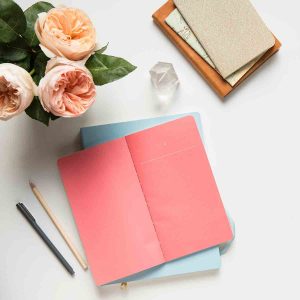 As I began to fight my way back up and out for the second time, I began to see that this road, though in some ways similar to my previous experience, was entirely different. During this time, I learned in familiar and unfamiliar ways how challenging and important it was for me to ask for the help and support I needed, allow those around me to cheer me on and hold me up often; at the very same time, I needed to show up for myself, take my own hands and actively walk myself towards healing, step by step. Somewhere along the way, I sat down and wrote a note to myself. I did my best to dig in below the voice in my head telling me to do otherwise, and I tried to write and say what I actually needed to hear most. This offered me both a voice and a message as I walked this non-linear, imperfect road of recovery. It also helped me to grow in ways I never imagined possible into a stronger and more open version of me.
As I began to fight my way back up and out for the second time, I began to see that this road, though in some ways similar to my previous experience, was entirely different. During this time, I learned in familiar and unfamiliar ways how challenging and important it was for me to ask for the help and support I needed, allow those around me to cheer me on and hold me up often; at the very same time, I needed to show up for myself, take my own hands and actively walk myself towards healing, step by step. Somewhere along the way, I sat down and wrote a note to myself. I did my best to dig in below the voice in my head telling me to do otherwise, and I tried to write and say what I actually needed to hear most. This offered me both a voice and a message as I walked this non-linear, imperfect road of recovery. It also helped me to grow in ways I never imagined possible into a stronger and more open version of me.
During this process of rebuilding and healing, even under the best of circumstances, when I was so fortunate and grateful to be held and supported in many ways by incredible friends, family, my therapist, and my community, there were certainly moments and times when the most genuine extensions of kindness and empathy just could not soften the walls I had built around myself. There were also times when these walls were raised so high, they kept me from myself. The moment I stopped trying to shatter them, they began to soften. The aloneness I felt in so many moments started to lessen as I slowly began to build and rebuild my relationship with my body and to connect to a part of my Self that has always been there fighting for me. This process of healing was both so gradual and monumental.
Note to Self:
No matter what
you have to eat.
No matter the volume of the voice in your head or the thoughts that say otherwise
No matter the emotions you are experiencing in this moment, this day, this week...
No matter what you ate yesterday, last meal, or last week
No matter how much or how little your body has moved lately
You must feed yourself
You deserve to feed your body
You deserve to feed your body
No matter what.
And if you can’t hear that you deserve to,
if that sentiment is unable to penetrate through the thoughts and the rigidity of the disorder in this moment,
then for now, just for now
hear that you have to.
You need to.
You have to eat you have to eat.
No matter what, you have to eat.
Take it bite by bite.
You have to eat the next bite, followed by the next and the next
and if you eat more bites that is even better.
I promise you,
I promise you with all my being,
You are ok to eat,
You will be ok.
This food will heal
not hurt.
And this food is required to help you heal.
Please feed your body
and when you feel you can’t,
know that you still must.
And one day it will not feel so utterly terrifying, overwhelming, and wrong,
this does get easier.
And for now it’s allowed to be difficult,
you get to kick and scream and tremble and question.
And you still have to eat.
You can do this.
You are right here.
Right here.
And you are never alone.
No matter what, you can do this,
and you have to do this.
You are right here,
go feed yourself.
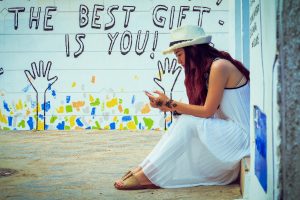 This note is one of many written during moments of challenge in my own recovery process as a reminder to myself. I am sharing it with you here and now with the hope that it reminds you of your own you: the part of you that is not your eating disorder, that part of you that is always there, that is always with you, and always fighting for you – even when it may not feel this way. And for those moments when perhaps you do feel alone, or the well-meaning and caring sentiments of those in your life are unable to reach you in the way you need most, I hope these words can remind you of the same force that is inside you and fighting for you just as it was for me. The part of you that chooses to continue to take steps towards recovery, to nourish yourself, take rest, reach out for connection and help. These little moments and actions add up, and within each one is healing.
This note is one of many written during moments of challenge in my own recovery process as a reminder to myself. I am sharing it with you here and now with the hope that it reminds you of your own you: the part of you that is not your eating disorder, that part of you that is always there, that is always with you, and always fighting for you – even when it may not feel this way. And for those moments when perhaps you do feel alone, or the well-meaning and caring sentiments of those in your life are unable to reach you in the way you need most, I hope these words can remind you of the same force that is inside you and fighting for you just as it was for me. The part of you that chooses to continue to take steps towards recovery, to nourish yourself, take rest, reach out for connection and help. These little moments and actions add up, and within each one is healing.
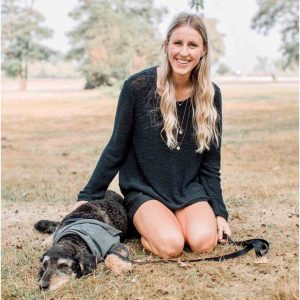
Julia C. Webster is a Masters of Counselling Psychology student who is endlessly fascinated by and in awe of the human experience, the ways we struggle and overcome, the growth that can come from the most challenging experiences. She is thrilled to become more involved with Looking Glass and the incredible, important work they’re doing. Julia is most known for her love of the ocean, walks in the woods, cozy coffee dates (especially at Revolver in gastown), and her wise, fluffy eyebrowed labradoodle, Lou.
[vc_row][vc_column][vc_column_text][printfriendly]
By Shaely Ritchey
The movie Eighth Grade by Bo Burnham is a modern day, coming of age story that focuses on a thirteen-year-old girl, growing up in today’s social-media obsessed and image-saturated world. Throughout the film, the main character Kaela spends an inordinate amount of time scrolling, liking, commenting, and incorporating the content she sees on social media, into her everyday life. Through the film we can see how social media influences the way this impressionable young person feels about herself and relates to her peers, in both positive and negative ways.
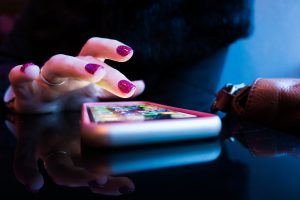 Commentary on social media in the modern age and its potential effects on young people is not a new concern, but it is something that is important to continue exploring and reflecting upon, mostly for young people living the experience of growing up in our modern world. In particular, I want to focus on beauty culture, make-up, marketing strategies, social media and imagery, and how this can impact the way we think about ourselves - not as a criticism necessarily, just as a reflective and thought-provoking exercise.
Commentary on social media in the modern age and its potential effects on young people is not a new concern, but it is something that is important to continue exploring and reflecting upon, mostly for young people living the experience of growing up in our modern world. In particular, I want to focus on beauty culture, make-up, marketing strategies, social media and imagery, and how this can impact the way we think about ourselves - not as a criticism necessarily, just as a reflective and thought-provoking exercise.
Near the beginning of the film Eighth Grade, we see Kaela deeply absorbed in a make-up tutorial on YouTube, carefully following the steps outlined by a bright and spotless young Caucasian woman in a clean, well decorated room, using supplies that indicate money is not too much of a concern for her. This is a pretty standard example of a make-up tutorial on YouTube of which there are countless varieties, from every day looks, to more exploratory make-up, to topics for specific features and how to work with them, to reviews of products, and so forth. The artistry of some of these individuals is quite extraordinary and, in some ways, quite inspiring as they re-claim beauty and make-up to be a form of self-expression: something they do for themselves rather than for the sake of looking nice for others. This idea, make-up as artistry and self-expression, has been pretty revolutionary in recent years, especially as we see more men allowing themselves this form of self-expression and a move towards breaking free from rigid gender norms and a gender binary that doesn’t reflect the fluid nature of gender for many people. On the other side of things, beauty culture has been criticized as a form of vanity and a focus on outward appearance over other, more important, aspects of the self. I’m not saying either view is right or wrong, but I do think it is important to recognize that beauty culture is a multi-billion-dollar industry and like any industry, it adapts to market itself effectively even if that is under the guise of artistry and self-expression.
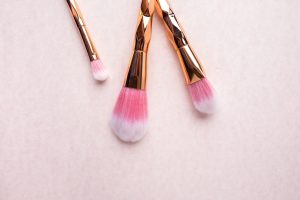 Like Kaela watching YouTube tutorials, when you see a beauty “guru” guiding you through the steps of make-up application, they essentially paint a new face onto themselves, re-shaping features that are unique to them into a culturally decided-upon ideal. Some people will see this as enhancing the features one already possesses, but in some ways, beauty culture creates more conformity than it does artistry. We paint the same facial structures on widely different appearances that come from different ethnic backgrounds to some universal, arbitrary ideal which typically tends to emphasize Caucasian features (such as a narrow nose, wide eyes, sharply defined cheekbones.) This can be potentially harmful for anyone, but particularly people of colour who are already under-represented and faced with an onslaught of Caucasian beauty ideals (straight hair, light skin, etc.). Like a Snapchat filter that universally alters everyone’s features to suit a standard idea of beauty, make-up functions like a real-life filter. While there’s nothing inherently wrong with that as make-up can certainly allow people to feel more confident, more put-together, and allows them to explore their beauty in a new way, it’s also important to note how it makes one feel about their natural, unfiltered and unaltered features. This state of filtered “beauty” has become easily accessible, literally at our fingertips, and the issue is it can make one feel not good enough without it and alone with our flaws as every image we see is smoothed, plumped, and altered to fit the ideal. But every single person is “flawed,” and that’s part of what makes us who we are.
Like Kaela watching YouTube tutorials, when you see a beauty “guru” guiding you through the steps of make-up application, they essentially paint a new face onto themselves, re-shaping features that are unique to them into a culturally decided-upon ideal. Some people will see this as enhancing the features one already possesses, but in some ways, beauty culture creates more conformity than it does artistry. We paint the same facial structures on widely different appearances that come from different ethnic backgrounds to some universal, arbitrary ideal which typically tends to emphasize Caucasian features (such as a narrow nose, wide eyes, sharply defined cheekbones.) This can be potentially harmful for anyone, but particularly people of colour who are already under-represented and faced with an onslaught of Caucasian beauty ideals (straight hair, light skin, etc.). Like a Snapchat filter that universally alters everyone’s features to suit a standard idea of beauty, make-up functions like a real-life filter. While there’s nothing inherently wrong with that as make-up can certainly allow people to feel more confident, more put-together, and allows them to explore their beauty in a new way, it’s also important to note how it makes one feel about their natural, unfiltered and unaltered features. This state of filtered “beauty” has become easily accessible, literally at our fingertips, and the issue is it can make one feel not good enough without it and alone with our flaws as every image we see is smoothed, plumped, and altered to fit the ideal. But every single person is “flawed,” and that’s part of what makes us who we are.
Even the supposed counter-culture is more about conformity than it is individuality. For example, Instagram and its countless images of young women with bright blush, coloured hair, fake freckles, and supposed make-up and style that, on the surface of things, defies traditional expectations, but in essence follows the same pattern of conformity. Again, there’s nothing inherently wrong with this, and no one is a “bad” person for participating in perpetuating these ideals, it’s just important to look at how it makes one feel about themselves because it can lead to low self-esteem and to limited views of oneself as only being valuable if one looks a certain way when true value is far beyond appearance.
Social media is a small, often filtered and posed glimpse into what people want others to see about their lives. It often doesn’t showcase other aspects of life that are entirely normal like textured skin, self-doubt, or weight that doesn’t sit in areas we have decided are socially acceptable. Beyond that it is often image-based and unlike the old adage, a picture really isn’t worth a thousand words: it tells you very little about a person, their likes and dislikes, experiences, thoughts, hopes and dreams, potential, challenges in life, etc.
In many ways social media can also serve to de-humanize the very people that are in the photos, whether that is through make-up that creates similar facial features on different individuals until everyone looks exactly the same or the more sinister and body-focused accounts that very rarely even showcase a human face, but instead, focus on some part of the body posed in a very particular way. Pro eating disorder areas of the internet are extreme examples of the harm images can pose, and the limitation of a single image.

None of this is to sound like the older culture criticizing the younger culture for their social media obsessed ways (except when it comes to pro eating disorder content which is just straight up harmful). In terms of beauty culture, it is kind of wonderful that people are exploring learning to love themselves, to focus on themselves and seeing themselves as something beautiful rather than the idea that any focus on oneself is selfish which leads to its own issues. That said, it’s always important to reflect on whether you’re actually empowering yourself and learning to love yourself, or whether you’re being guided into the idea that you, as you are, are not good enough and that you need to change yourself in order to fit in. Remarkably, in Eighth Grade, a startlingly realistic movie about a young girl written and directed by a man, we end the film on a hopeful note as Kaela begins to develop a picture of her life outside of all the images she is surrounded by, telling her what that is supposed to look like and who she is supposed to be. The movie, and hopefully this post, can serve as an important reminder that we are flawed and that is okay, that social media is a limited representation of people, and that we are so much more beautiful and worth far much more than appearance. Remember, we’re not here to look beautiful, we’re here to live our lives in the various wonderful ways we can.[/vc_column_text][vc_empty_space][vc_separator][/vc_column][/vc_row][vc_row][vc_column][vc_empty_space][vc_column_text]

Shaely is a registered nurse with interest in further education in nursing or medicine. She is also a passionate mental health advocate in her community. In her spare time she loves taking photographs, getting outdoors, and petting as many dogs as she can.
[/vc_column_text][/vc_column][/vc_row]
By Kaela Scott
As a therapist, many people believe that the main area of focus in my work with clients would be on helping them understand and work through their emotions. This belief would be accurate. What causes the most grief, however, is trying to get people to understand the difference between feeling their emotions and thinking about their emotions. One of my clients this week made a really important point this week; he said “ I have always focused on getting through my feelings with a focus on getting to the other side, instead I need to be in my emotions, with the focus being on actually experiencing them.”
Emotions have a role in everything that we do and the more familiar we become with them, the healthier and happier we can be.
The more we focus on pushing through, with hopes of ultimately freeing ourselves of our feelings, the longer we remain hostage to them. Emotions have a role in everything that we do and the more familiar we become with them, the healthier and happier we can be.
Funnily enough, when I challenge individuals on what they want to accomplish out of our work together, I often hear the words “ I just want to be happy.” Happiness is an emotion – it’s an important emotion and one that feels so lovely to experience – but it’s still an emotion. Most people don’t strive to push through happiness but to be present in their happiness and to absorb as much of it as they can. Sadness on the other hand, is an emotion that holds just as much significance but feels a lot less enjoyable to experience.
All emotions are important, some just feel better than others. Instead of focusing on pushing through, I encourage clients to try to just sit with them, pay attention to how they feel, notice where they experience them in their bodies. The more present we are with our emotions as they arise, the less control they have over one’s life. Instead of pushing, we sit. Instead of trying to get through them, we remain with them. This is what ultimately allows us to move through our painful feelings faster so we can experience the joy and peace we are looking for.
I often get asked how to do this – what tool can I provide clients with to become experts in understanding and processing their feelings? The number one thing I recommend is to actually be present in their body. Most claim that they pay attention to their body but they do so with a sloppy, typically neglectful approach. Instead, be as methodical and detail oriented as you can be. When I ask clients how they know the difference between their happiness vs sadness vs anger vs. love they tell me they feel different; their experience in their bodies is different with each emotion. So start noticing exactly how an emotion feels in your body. Compare them if you need to (how do I know I’m not happy? What makes this feeling different than happiness) and figure out where you physically notice those emotions. Be precise in your language – does your chest feel heavy? Do you feel tears in your eyes and a lump in your throat? Do you feel like your energy has been depleted? Do you feel like you have so much energy you want to dance? Does your chest feel open and airy? Are your hands relaxed or clenched?
Get so curious about yourself that you know exactly what each feeling feels like in your body. Your thoughts will follow and will give you their opinion, but your body will allow you to experience your emotions so that you can move, not push, through them to the other side.
 Kaela Scott is a Registered Clinical Counsellor who specializes in Eating Disorders. She runs her own private practice and works with the Looking Glass Foundation in both their summer camp and their Hand In Hand Program. She has been passionate about working with eating disorders since freeing herself from her own struggle and realizing what it is like to be happy and well. When she isn’t working, you can find Kaela either cozying up with a cup of tea and her friends or up in the mountains going for a hike.
Kaela Scott is a Registered Clinical Counsellor who specializes in Eating Disorders. She runs her own private practice and works with the Looking Glass Foundation in both their summer camp and their Hand In Hand Program. She has been passionate about working with eating disorders since freeing herself from her own struggle and realizing what it is like to be happy and well. When she isn’t working, you can find Kaela either cozying up with a cup of tea and her friends or up in the mountains going for a hike.